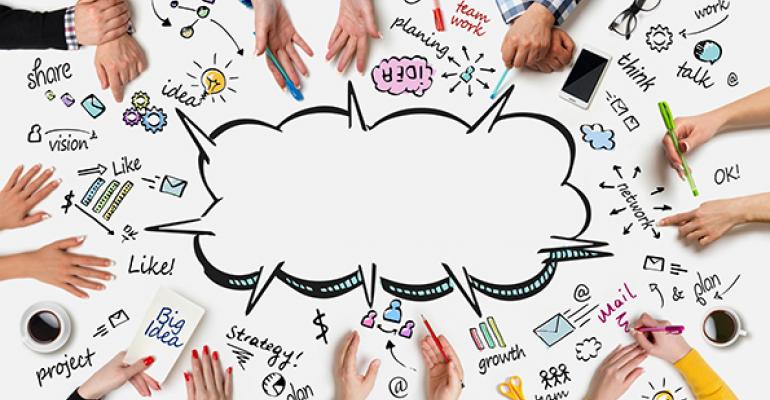
The American Society for Association Executives recently announced it was launching not just a new event, but a new kind of event called Xperience Design Project, powered by ASAE, or XDP for short. Not just because it could, or because it wanted to try some interesting experiment, but because today’s environment demands giving people the option of participating in something that's designed to be a co-created, interactive, team-based, practical experience that results in stronger relationships and take-home-and-use solutions. (Read all about XDP here.)
In a press call, Don Neal, founder and CEO, 360 Live Media, which partnered with ASAE to design XDP, explained how the changes in the world we live in are driving the need for a different kind of event. Not that ASAE is giving up any of its old models, though the venerable Springtime Expo is being replaced by XDP. ASAE President and CEO John Graham was adamant that all of the association’s other events would go on as usual, including the annual conference. But, as Graham noted, that may change five or 10 years down the road as our world continues to transition.
So, the three main trends driving this change, according to Neal, are:
1. Audience expectations are changing. Once upon a time, audiences were pretty homogenous, but now we have five generations learning together at conferences. “Events have to appeal to many different demographics, all with different expectations and different learning styles,” Neal said.
Another thing that’s changed with audiences are social norms. “It’s much more acceptable now to be on your phone or tablet in the presence of other people,” he said. “Technology is an extension of all of us today, and that’s changing the way we meet, learn, engage, and come together as a community.”
And, of course, our attention spans are shorter than they used to be. Neal said the average attention span of an adult in a learning environment is around seven minutes. Ideally, events should be continually re-engaging and reconnecting with participants every seven minutes.
2. The event landscape is changing. I found this point to be fascinating: He said that people’s expectations for an event are being formed by events they probably haven’t even attended but have heard about, such as the Aspen Ideas Festival, Bonnaroo, and TED.
3. The experience economy is now an everyday fact. “If you have a daughter and have been to an American Doll store, you know what it’s like to spend $200 on a doll and then spend $200 to have tea with a doll. That’s the experience economy,” said Neal. Everything strives to be an experience now, from retail stores to car dealerships. People expect what used to be a transaction to be an experience now, he said. “You have to deliver on the expectations of the audience.”
All Hail the Rise of Collaboration and Co-Creation
I must live under a rock—I had never heard of a Coke Freestyle machine until Neal mentioned it, but apparently there is such a thing where you can, by pushing different buttons, customize your soda to your exact liking. Nike customers can, for a price, mix and match fabrics and colors and soles and uppers to create their own one-of-a-kind shoe. Organizations are welcoming consumers into the creation process. In turn, consumers feel more ownership of the products, and are willing to buy more of them.
but apparently there is such a thing where you can, by pushing different buttons, customize your soda to your exact liking. Nike customers can, for a price, mix and match fabrics and colors and soles and uppers to create their own one-of-a-kind shoe. Organizations are welcoming consumers into the creation process. In turn, consumers feel more ownership of the products, and are willing to buy more of them.
We not only want experiences, but we want customized experiences. Not surprising, but also not so easy to pull off! Neal said to expect that your meeting’s participants are going to want to have a hand in creating their own experience at the meeting as well. That’s why XDP organizers involved the business partners and the vendors who sell to the association membership at ASAE, a cross-section of association executives, meeting professionals, and programming folks when designing the new event.
I'm pretty excited about the concept of ASAE's new event, and am already lobbying to be able to participate (Springtime hasn't been on my conference schedule for a while). What do you think? Is this a model that might work for some of your meetings?
Aside: While writing this, I kept calling XDP an event, not a meeting, but I'm not feeling quite right about it. And that made me think about a comment to a recent post from someone who says it's an insult to call "meeting planning" "event planning," since that refers more to special events like weddings, festivals, etc. And yet I cannot, in good conscience, call XDP a meeting, with all the baggage that term carries with it (one-way info dumps, sitting still in rows, speaker-centric, PowerPoint-dependent, etc.).
I think the terms are blurring, with more meetings, as they become more immersive and experiential and interactive, taking on some characteristics of events. Just I find myself hesitant to call the job "meeting planner" (in favor of terms like event designer or meeting producer) and the people who go to these things "attendees" (I tend to call them participants, but that's not quite right either), I don't want to call a meeting that bears little resemblance to a traditional meeting a "meeting."
Do we need to reimagine what we call these things? "Experience" is too vague and twee for me, and "event," as our commenter pointed out, has baggage of its own. What do you think would be a good name to describe what meetings are morphing into? Or do you think "meetings" can lose the baggage and morph along with them?




